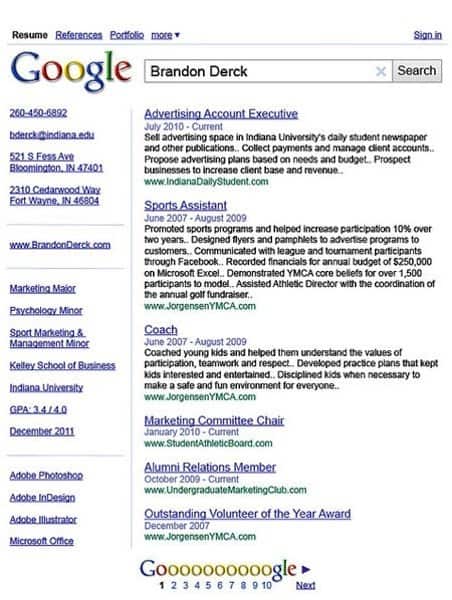Mastering Tech Technical Writing: Enhance Your Skills Today

Enhancing your technical writing skills is of paramount importance in anticipation of your coding interview, due to its influential role in your performance. It acts as a mechanism to express your ideas clearly, showcasing your adeptness in systematic problem-solving and precision focus. In this part, we shall delve into diverse techniques, guidelines, materials, and tactics designed to hone your technical writing abilities, consequently paving the way for your success in the coding interview.
Key Takeaways
- Technical writing skills are essential for successful coding interviews.
- Effective communication and attention to detail can set you apart from other candidates.
- By mastering technical writing concepts and strategies, you can approach coding interview questions with confidence.
- Utilizing resources and practicing consistently can help you maximize your potential.
Understanding the Coding Interview Process
When preparing for a coding interview, it’s important to first understand the interview process. The coding interview process is designed to evaluate your problem-solving skills, technical knowledge, and communication ability. It typically consists of several stages, including:
- Introduction: The interviewer introduces themselves and explains the structure of the interview.
- Technical questions: The interviewer asks a series of technical questions to evaluate your knowledge of programming concepts and languages.
- Coding exercise: You’re given a coding problem to solve within a specific timeframe. The interviewer evaluates your problem-solving process and the efficiency of your code.
- Wrap-up: The interviewer may provide feedback on your performance and ask if you have any questions.
By understanding the coding interview process, you can tailor your preparation accordingly. This includes practicing your problem-solving skills, reviewing technical concepts, and honing your communication ability. Remember to stay calm, focused, and confident throughout the interview process. To achieve this, consistent practice and preparation are key.

Types of Coding Interview Questions
Coding interview questions can vary depending on the company and the specific role you’re applying for. However, there are some common types of coding interview questions to be aware of:
- Algorithms and data structures:
- Sorting algorithms
- Binary search
- Linked lists and trees
- Scaling web applications
- Database design
- Network architecture
- Object-oriented programming concepts
- Web development frameworks
- Machine learning libraries
Make sure to research the company and the role you’re applying for to get a better idea of the types of coding interview questions you may face.
Assessing Your Current Skillset
Before diving into coding interview preparation, it’s important to assess your current skillset. Knowing your strengths and weaknesses will help you focus your preparation efforts and improve your chances of success.
Start by identifying the programming languages you know. Consider your proficiency level in each language, and take note of any areas you need to improve on. Then, move on to assessing your knowledge of data structures and algorithms. Are you familiar with the most common data structures such as arrays, linked lists, and stacks? Have you practiced implementing popular algorithms such as binary search, quicksort, and breadth-first search?
One effective way to evaluate your coding skills is through online coding platforms such as HackerRank, LeetCode, and Codecademy. These websites offer various coding challenges and exercises that can help you gauge your ability and knowledge. You can also consider taking coding courses or workshops to improve your skills in specific programming languages, frameworks, or libraries.
Remember to take note of your progress and revisit your self-assessment regularly. By continually evaluating your skillset and improving your weaknesses, you can boost your confidence and ace your coding interviews.

Researching Common Interview Questions
One of the most effective ways to prepare for a coding interview is to research and practice common interview questions. This will not only help you familiarize yourself with different problem-solving techniques but also boost your confidence.
There are various resources and platforms available online where you can find coding interview questions. Some popular websites include LeetCode, HackerRank, and CodeSignal. These websites offer a wide range of questions categorized by difficulty level, company-specific questions, and other relevant topics.
| Website | Features |
|---|---|
| LeetCode |
|
| HackerRank |
|
| CodeSignal |
|
In addition to these platforms, you can also find coding interview questions on online forums like Quora and StackOverflow. These forums not only offer coding questions but also provide solutions and explanations, making them a great resource for learning and practicing.
It’s essential to practice a wide range of coding interview questions to build a strong foundation in problem-solving techniques and algorithms. Make sure to track your progress and identify areas where you need improvement.

Strengthening Your Problem-Solving Skills
As coding interviews primarily focus on testing your problem-solving abilities, it’s crucial to adopt effective techniques and strategies to succeed. Here are some coding interview techniques and practices to help you refine your problem-solving skills:
Algorithm Design
Algorithm design is the foundation of solving complex coding problems. Breaking down a problem into smaller, more manageable components, and identifying an effective algorithm to solve each component is key to successful coding interviews. Practice identifying algorithms for various real-world problems to get better at this skill.
Data Structures
Understanding data structures and identifying the most efficient one for a specific problem is another crucial factor in coding interviews. It’s important to have an in-depth understanding of data structures such as arrays, linked lists, stacks, queues, and trees. Practice implementing these data structures in various problem-solving scenarios.
Efficient Coding Practices
Writing efficient code is essential in coding interviews, especially when it comes to time complexity. It’s important to follow best coding practices such as code modularity, reusable code, and commenting. Additionally, use efficient data structures and algorithms to minimize the number of code executions.
Consistent Coding Practice
Consistent coding practice is key to sharpening your problem-solving skills. Participate in coding challenges and contests, solve coding problems on a daily basis, and review your solutions to understand the most efficient approach. Utilize online coding platforms for practice as well.
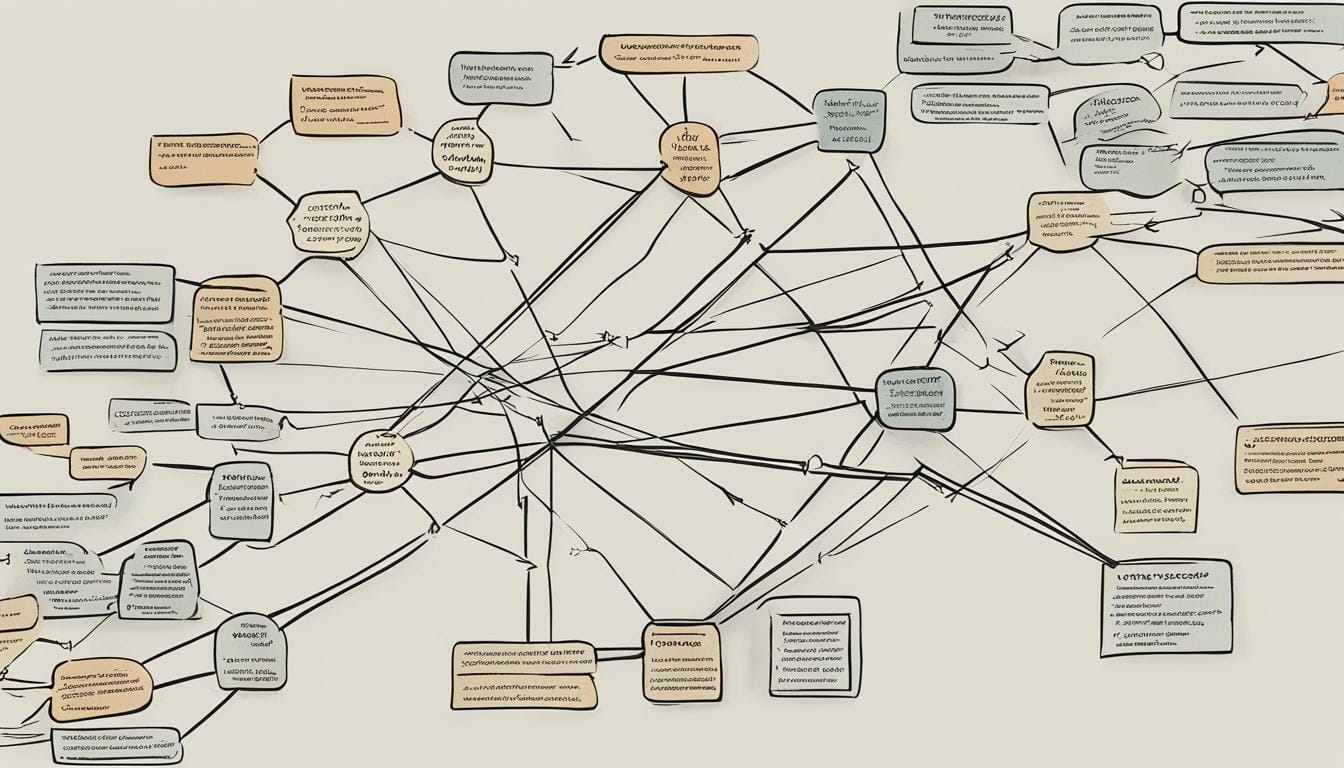
Incorporating these coding interview techniques and practices into your preparation routine can help you become better at solving complex coding problems. Keep practicing, and you’ll notice a significant improvement in your problem-solving speed and accuracy.
Mastering Technical Concepts and Algorithms
Having a solid understanding of technical concepts and algorithms is essential for excelling in coding interviews. I recommend creating a comprehensive study guide for yourself to ensure you cover all essential topics relevant to your programming language or area of expertise. Here are some coding interview strategies to help you effectively master technical concepts and algorithms:
- Start with the basics: Begin by studying and understanding foundational concepts such as data structures (arrays, linked lists, trees, graphs, etc.), algorithms (sorting, searching, hashing, etc.), and object-oriented programming principles (encapsulation, inheritance, polymorphism, etc.).
- Practice, practice, practice: Consistent coding practice is key to mastering technical concepts and algorithms. Find coding challenges and exercises that align with your study guide and practice them regularly. Consider using online platforms such as LeetCode, HackerRank, or CodeSignal.
- Collaborate with peers: Joining coding communities and collaborating with peers is an effective way to learn from others and gain new perspectives. Consider joining online forums such as Stack Overflow or GitHub, or participating in coding groups or hackathons.
- Use coding interview study guides: Utilize coding interview study guides to gain an in-depth understanding of specific topics and their applications. Popular study guides include “Cracking the Coding Interview” by Gayle Laakmann McDowell and “Programming Interviews Exposed” by John Mongan, Eric Giguere, and Noah Kindler.
- Explore online resources: Online resources such as MIT OpenCourseWare, Coursera, or Udemy offer courses and tutorials on programming concepts and algorithms. These resources can be especially helpful for visual or hands-on learners.
By incorporating these coding interview strategies into your preparation routine, you can approach coding interviews with confidence and a solid foundation of technical knowledge.
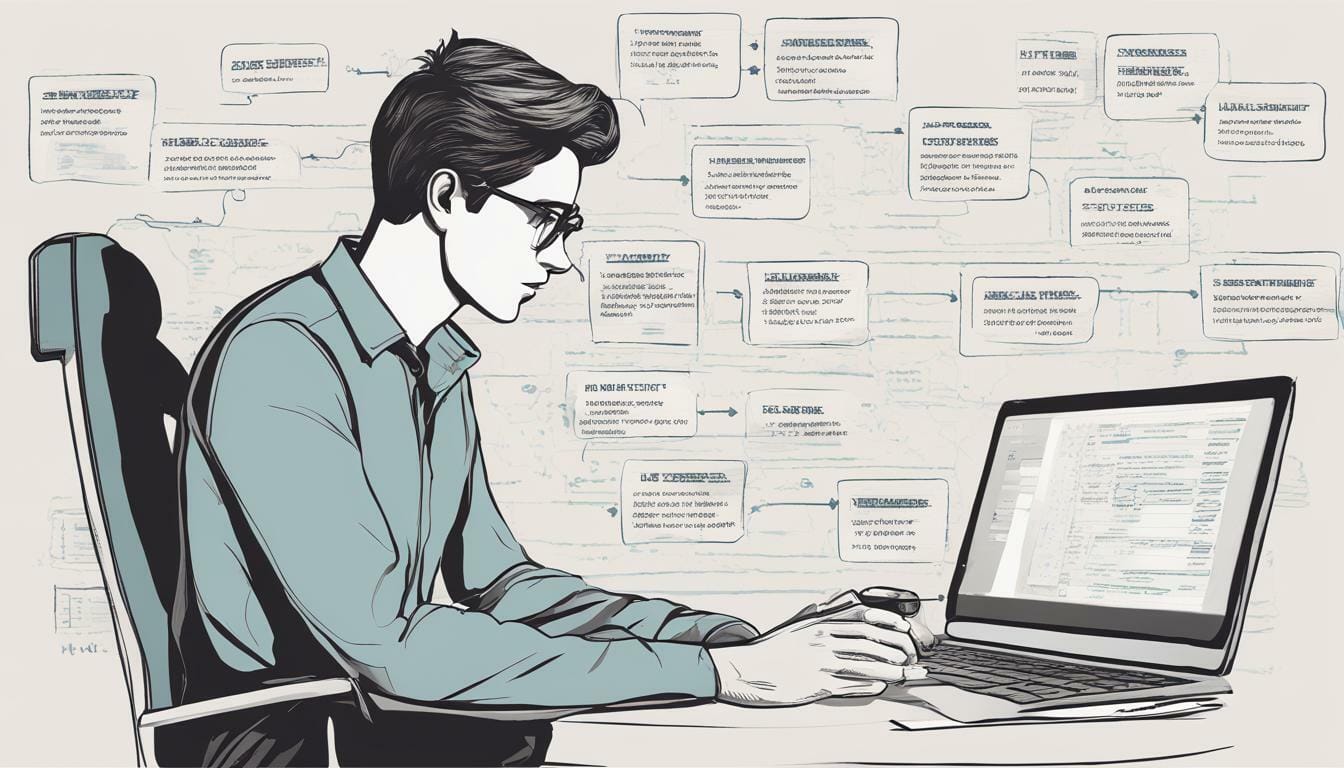
Practicing Mock Interviews and Coding Challenges
Practicing mock interviews and coding challenges is one of the most effective ways to prepare for a coding interview. Not only does it help you simulate the real interview scenario, but it also helps you identify your strengths and weaknesses in problem-solving, time-management, and communication skills.
There are many online platforms and resources that offer mock interviews and coding challenges. Some of the popular ones include HackerRank, LeetCode, and CodeFights. These platforms offer a range of coding problems with varying difficulty levels and time constraints, allowing you to practice under real-time pressure.
When practicing mock interviews and coding challenges, it’s important to time yourself and approach the problems with a clear and structured thought process. Start by understanding the problem statement, identifying the requirements and constraints, and designing a high-level solution strategy. Then, break down the problem into smaller subproblems and gradually implement your solution, testing along the way.
Additionally, it’s important to seek feedback from peers, mentors, or coding communities to improve your performance. Many coding communities offer code review sessions, where you can share your code and receive constructive criticism and feedback.
By integrating mock interviews and coding challenges into your preparation routine, you can enhance your problem-solving techniques, improve your speed and accuracy, and develop an effective approach to coding interviews.

Leveraging Online Coding Resources and Tools
As a coding interview candidate, you must be familiar with online resources and tools that can help enhance your preparation. In this section, I will discuss some of the most popular coding interview resources available.
Coding Platforms: Coding platforms such as LeetCode, HackerRank, and CodeSignal offer a wide range of coding challenges and problems to improve your technical skills. These platforms allow you to track your progress, compare your performance with other users, and practice coding under time constraints.
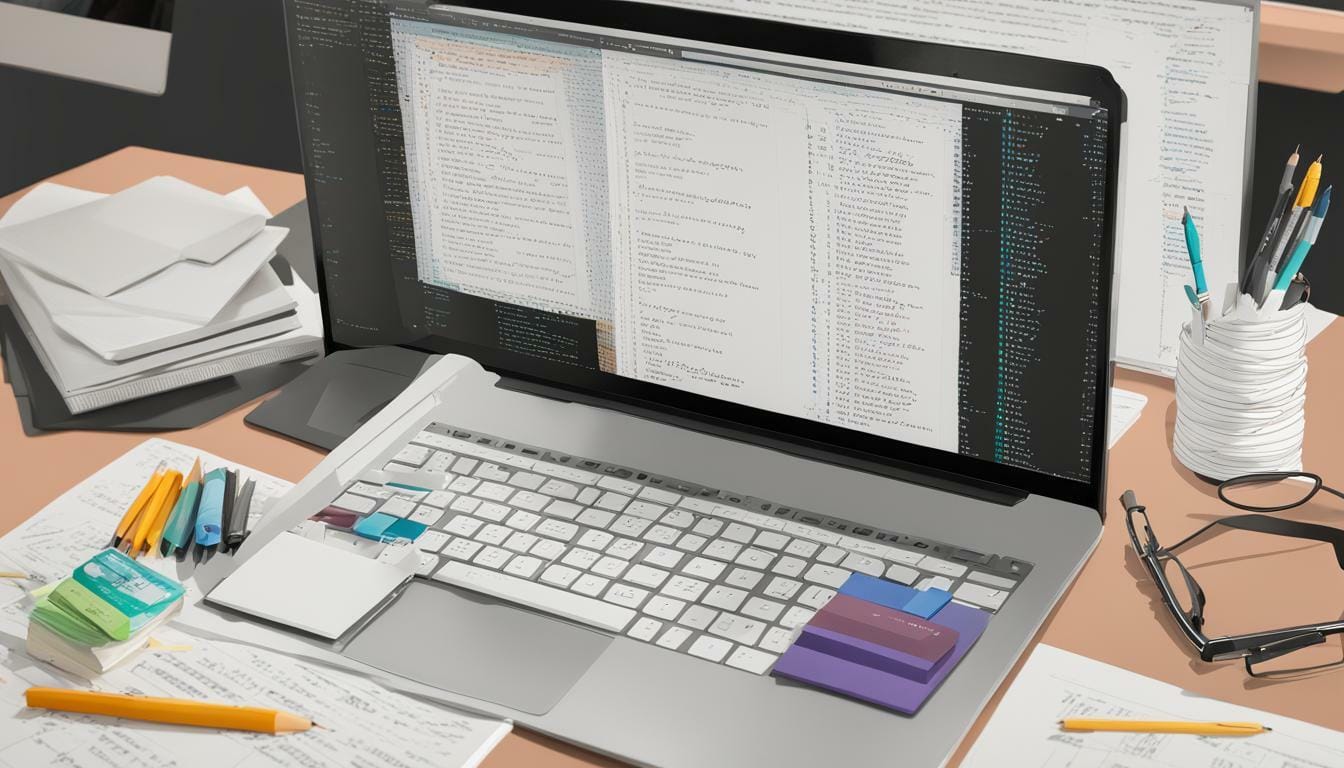
Online Communities: Joining online communities such as Stack Overflow, Reddit, and GitHub can provide you with access to a wealth of coding knowledge and expertise. These communities also offer forums where you can ask questions, participate in discussions, and learn from experienced developers.
Online Tutorials: Online tutorials and courses are a great way to supplement your coding interview preparation. Platforms such as Udemy, Coursera, and edX offer online courses on a wide range of coding concepts and languages. These courses allow you to learn at your own pace and provide you with a structured learning path.
Code Libraries: Code libraries, such as GitHub and GitLab, provide you with access to an extensive collection of code snippets and repositories. You can use these resources to learn from other developers’ coding styles, techniques, and approaches to problem-solving.
Practice Interviews: Practicing mock interviews with friends, colleagues, or professional coaches can provide valuable feedback and help you simulate the real interview experience. Platforms such as Pramp and Gainlo offer online mock interview services and allow you to practice with other candidates.
By leveraging these online coding resources and tools, you can improve your technical skills, learn from experienced developers, and stay updated with the latest coding trends and practices.
Sharpening Your Communication and Soft Skills
Effective communication and soft skills are essential in coding interviews. While coding skills are crucial, being able to articulate ideas, collaborate with others, and work under pressure are equally vital. Here are some coding interview techniques and practices to improve your communication and soft skills:
1. Practice Explaining Your Thought Process
During a coding interview, it’s important to explain your thought process as you solve problems. This demonstrates your problem-solving approach and helps the interviewer understand your thinking. Practice explaining your ideas and thought process to friends or family who may not be familiar with coding. This will help you develop concise explanations and avoid jargon.
2. Participate in Coding Communities
Participating in coding communities can help you improve your communication and collaboration skills. These online platforms provide opportunities to discuss coding concepts, ask questions, and receive feedback from experienced developers. By participating in these communities, you can learn from others, refine your communication skills, and develop new approaches to problem-solving.
3. Attend Coding Meetups
Coding meetups and events are great opportunities to network with fellow coders and improve your soft skills. These events often include group activities and discussions, which can help you build collaborative skills. Additionally, attending these events can help you stay up to date with the latest coding trends and best practices.
4. Participate in Mock Interviews
Participating in mock interviews is an effective way to prepare for coding interviews and improve your communication skills. During mock interviews, you can practice problem articulation, receive feedback on your presentation style, and develop strategies for answering common interview questions. This will help you build confidence and improve your performance during real coding interviews.
5. Develop Your Non-Technical Communication Skills
While technical skills are essential for coding interviews, non-technical communication skills are equally important. These skills include active listening, body language, and conflict resolution. Practice these skills in your everyday life and seek feedback from friends or family to identify areas for improvement.
By incorporating these coding interview techniques and practices into your preparation routine, you can improve your communication and soft skills, build confidence, and maximize your chances of success in coding interviews.
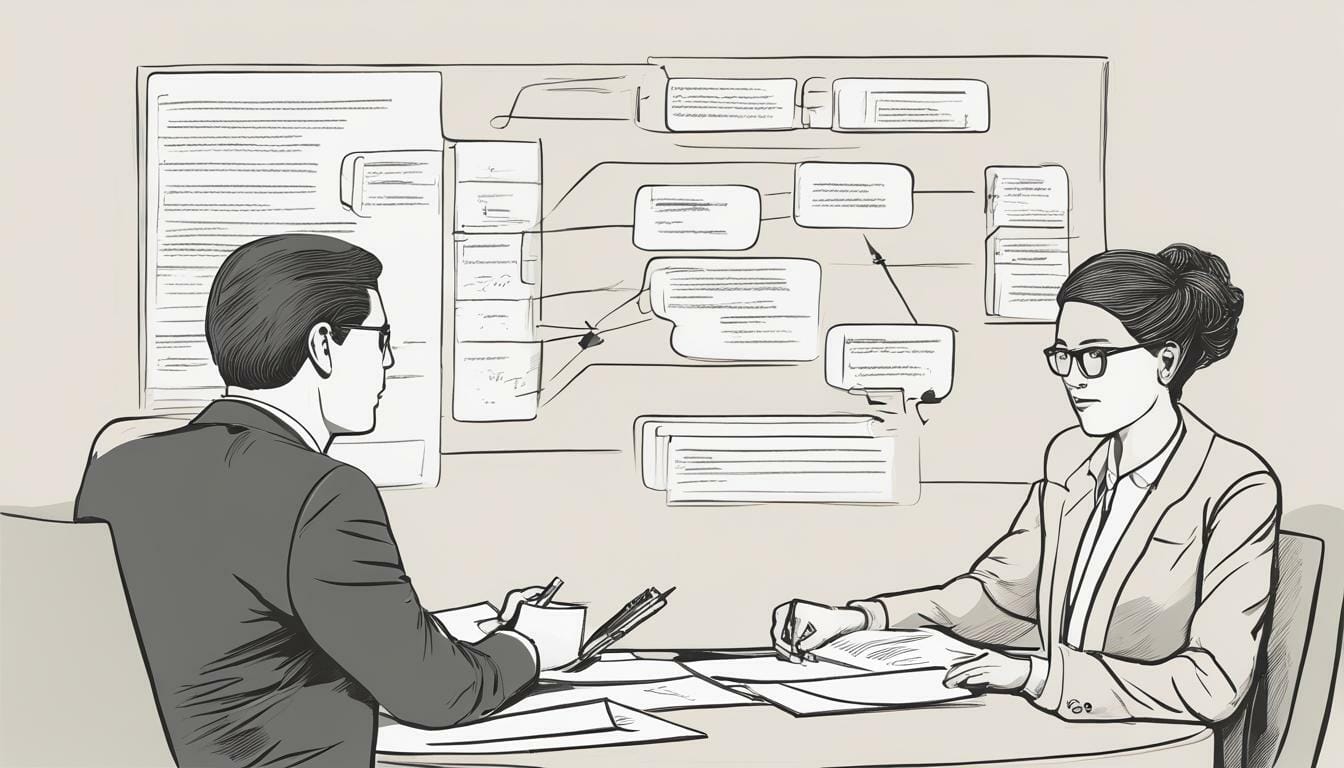
How Can I Apply the Basics of Writing Algorithms to Enhance my Technical Writing Skills?
When looking to enhance technical writing skills, it can be helpful to apply the basics of writing algorithms for beginners. By structuring your content logically and breaking it down into clear steps, you provide readers with a systematic approach to understand complex concepts. This method ensures clarity, promotes easy comprehension, and enhances the overall quality of your technical writing.
Building Confidence and Managing Interview Stress
Preparing for a coding interview can be stressful and overwhelming, but building confidence and managing stress is crucial for optimal performance. Here are some coding interview strategies to help you stay calm and focused:
- Practice, Practice, Practice: Consistent coding practice can improve your problem-solving skills and boost your confidence. Set aside dedicated time each day to practice coding exercises and algorithms.
- Visualization Exercises: Visualize yourself acing the interview, confidently answering questions and solving problems. This technique can help reduce anxiety and increase positivity.
- Breathing Techniques: Deep breathing exercises can help calm nerves and reduce stress. Take a few deep breaths before the interview to help relax your mind and body.
- Positive Self-Talk: Talking positively to yourself can go a long way in boosting your confidence. Replace negative thoughts with positive affirmations, such as “I am well-prepared for this interview.”
- Mock Interviews: Practicing mock interviews with friends or mentors can simulate the real interview experience and help you become more comfortable with the process.
Remember, managing interview stress is an ongoing process. Incorporating these coding interview strategies into your preparation routine can help you build confidence, reduce stress, and perform at your best during coding interviews.

How Can Technical Writing Skills Benefit Coding?
Having strong technical writing skills can greatly benefit coding by allowing developers to clearly and effectively communicate their ideas and methodologies. This is especially important when collaborating on projects or documenting code for others to use. Learning technical writing through free coding lessons today can improve a coder’s ability to convey complex information.
Conclusion
Preparing for a coding interview can be a daunting task, but with the right approach, it can be an exciting opportunity to showcase your skills and potential. Throughout this article, we’ve discussed various strategies, tips, and resources to help you master the art of coding interview preparation.
It’s essential to familiarize yourself with the coding interview process and assess your current skillset before beginning the preparation journey. Researching common interview questions and practicing mock interviews and coding challenges can help you build confidence and improve your problem-solving skills. Additionally, mastering technical concepts and algorithms, leveraging online coding resources and tools, and sharpening your communication and soft skills can significantly enhance your preparation.
Remember, consistent practice, continuous learning, and confidence-building exercises are key to successful coding interview preparation. Approach each interview with a calm and focused mindset, and don’t hesitate to seek feedback and learn from your mistakes.
Good luck with your coding interview journey!
FAQ
Q: What is the importance of mastering technical writing skills?
A: Mastering technical writing skills can help you prepare for a coding interview by improving your ability to effectively communicate complex ideas and concepts. It allows you to clearly articulate your thoughts and solutions, which is crucial during the interview process.
Q: How can I prepare for a coding interview?
A: To prepare for a coding interview, you can utilize various techniques such as researching common interview questions, strengthening problem-solving skills, mastering technical concepts and algorithms, practicing mock interviews and coding challenges, leveraging online coding resources, and sharpening communication and soft skills.
Q: What should I expect during a coding interview?
A: During a coding interview, you can expect to be asked various types of questions that test your problem-solving abilities, coding skills, and understanding of technical concepts. The interview process may also include evaluation criteria such as efficiency of your code, ability to work under pressure, and collaboration skills.
Q: How can I assess my current skillset?
A: You can assess your current skillset by conducting self-assessment exercises that focus on different coding concepts and languages. These exercises will help you identify your strengths and weaknesses, allowing you to tailor your preparation to focus on the areas that need improvement.
Q: Where can I find common interview questions to practice?
A: There are various resources and platforms where you can find common interview questions to practice. Some popular options include coding interview books, online coding platforms, coding interview websites, and coding community forums.
Q: How can I strengthen my problem-solving skills?
A: You can strengthen your problem-solving skills by focusing on techniques such as algorithm design, understanding data structures, and practicing efficient coding practices. Consistent coding practice and utilizing platforms and resources that offer coding challenges can also help improve your problem-solving abilities.
Q: What are some essential technical concepts and algorithms to master?
A: To excel in coding interviews, it’s important to have a solid understanding of technical concepts and algorithms such as data structures, algorithms, object-oriented programming, and more. By mastering these concepts, you can confidently approach coding interview questions.
Q: Why is practicing mock interviews and coding challenges important?
A: Practicing mock interviews and coding challenges allows you to simulate the real coding interview experience. This helps you become familiar with the types of questions asked, improve your problem-solving speed, and develop effective strategies for solving coding challenges under timed conditions.
Q: How can I leverage online coding resources and tools?
A: Online coding resources and tools can significantly enhance your coding interview preparation. They offer coding practice, tutorials, and discussions that can help expand your knowledge, learn from experts, and stay updated with the latest coding trends. Popular coding platforms, online communities, and coding websites are great places to start.
Q: Why are communication and soft skills important during coding interviews?
A: Communication and soft skills are important during coding interviews as they enable you to effectively communicate your ideas, articulate problems, and collaborate with interviewers. These skills showcase your ability to work well in a team and can help create a positive impression during the interview process.
Q: How can I build confidence and manage interview stress?
A: Building confidence and managing interview stress is essential for optimal performance during coding interviews. Techniques such as positive visualization, deep breathing exercises, and maintaining a growth mindset can help boost your confidence and manage stress. Incorporating these strategies into your preparation routine can help you approach coding interviews with a calm and focused mindset.



